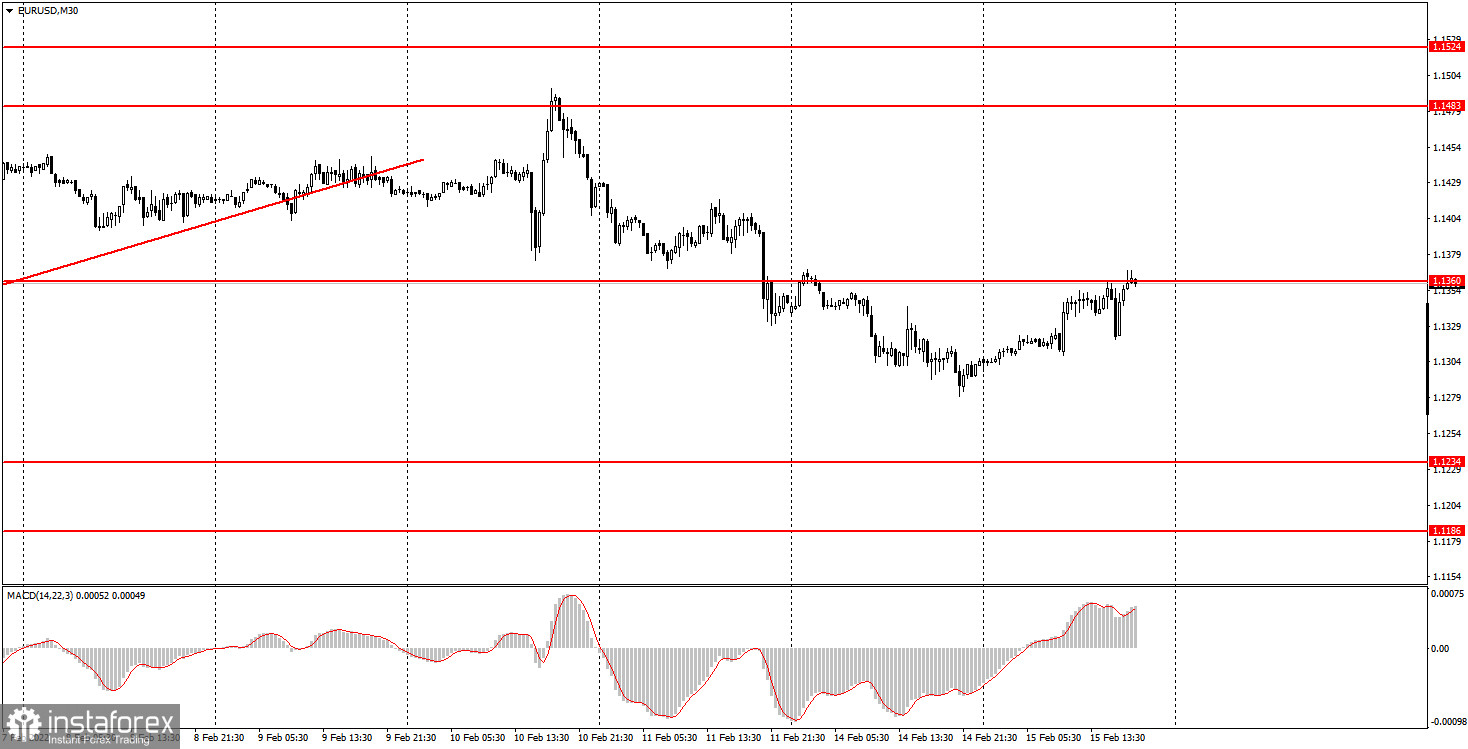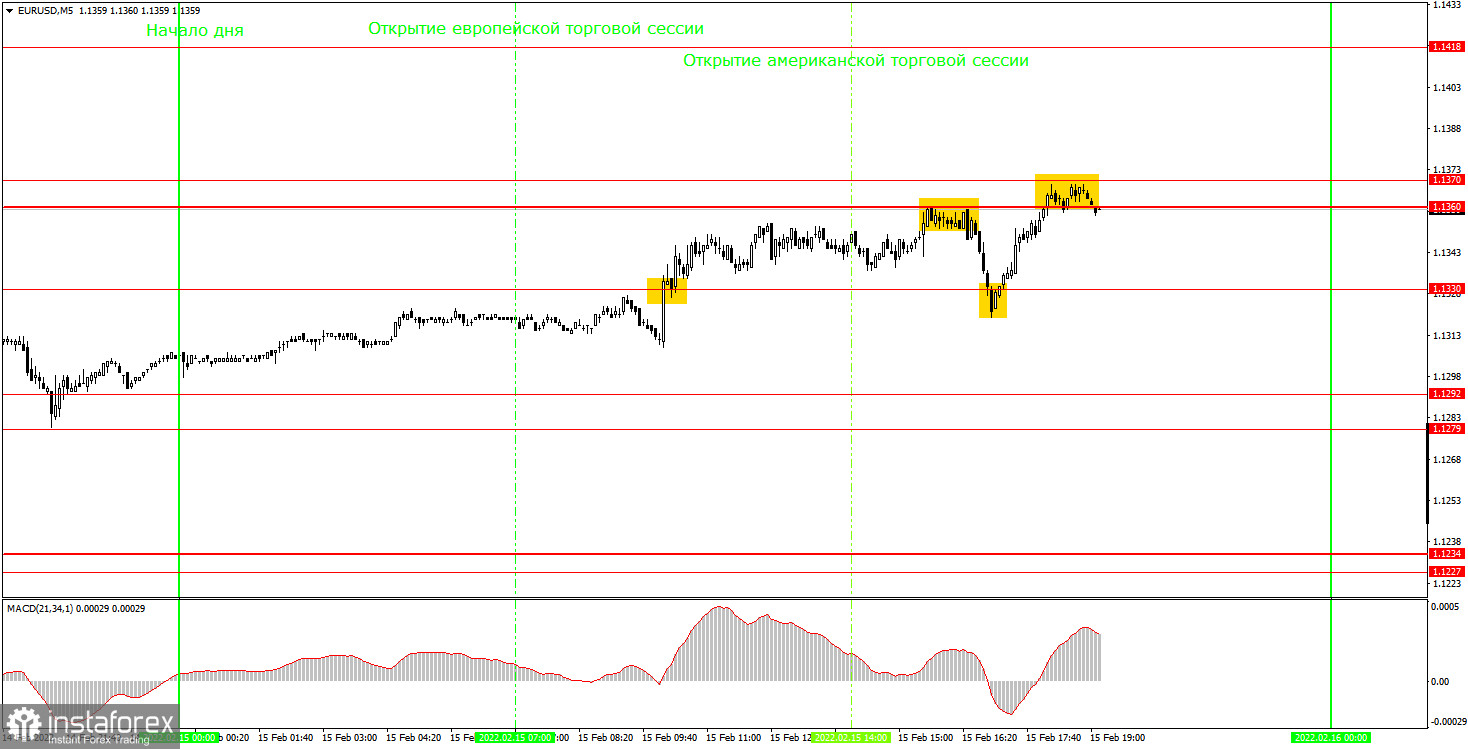Analyzing trades on Tuesday
EUR/USD on 30M chart

On Tuesday, EUR/USD was going through a correction after a new downward cycle. We would like to remind beginners that when the price consolidated below 1.1360, the new movement could have been considered a downtrend. Yet, there is no trendline or channel at the moment and there is no way to build them yet. In the course of the session, the pair returned to the level of 1.1360 and rebounded from it. The daily volatility today was less than 60 pips, which is average for the euro/dollar pair. There was no important news on Tuesday, but still, it was quite an eventful day. Most of the events concerned geopolitics and only some of them were of economic nature. In particular, the EU released the second estimate of GDP for the fourth quarter. It came fully in line with the first one, so there was no reaction from the market. Yet, the key event was the news about Russia's troops pulling back from the Ukrainian border. This could be the reason why the US dollar dropped in the first half of the day. In any case, the movement within 30-40 is quite average.
EUR/USD on 5M chart

On the 5-minute time frame, we could clearly observe an uptrend. However, the movement itself was not very favorable for traders. Thus, during the day, the price made two sharp and unexpected reversals followed by a strong movement. This may happen again in the future due to the uncertain geopolitical situation, and we need to be ready for this. The first buy signal was formed when the pair consolidated above the level of 1.1330. Then the quotes approached 1.1360 and rebounded from it. At this moment, the second sell signal was formed. This is when traders should have closed long positions and opened short ones. The next reversal took place near the level of 1.1330, but the rebound was not too accurate. Later, the quote resumed an uptrend and advanced to 1.1360. Thus, it was possible to open three trades on Tuesday and close all of them with a small profit since there is only a 30-pip distance between 1.1330 and 1.1360. So, each trade could have brought you 10-12 pips.
Trading tips on Wednesday
On the 30-minute time frame, the uptrend was canceled as the pair failed to overcome the level of 1.1483 and consolidated below 1.1360. It is difficult to build a trendline now as no two clear pivot points can be found. Given the fundamental background, we believe that the pair is likely to keep falling. In the next 24 hours, the key level of 1.1360 will indicate a possible start of a decline in the pair. On the 5-minute chart on Wednesday, it is recommended to trade at the levels of 1.1279-1.1292, 1.1330, 1.1360-1.1370, and 1.1418. As soon as the price moves by 15 pips in the right direction, you should set a Stop Loss to the breakeven point. On Wednesday, the US will publish the data on industrial production and retail sales for January. These reports are unlikely to influence the market sentiment, especially when all the focus is on geopolitics now. As for the EU, there is an even less important report on industrial production.
Basic rules of the trading system
1) The strength of the signal is determined by the time it took the signal to form (a rebound or a breakout of the level). The quicker it is formed, the stronger the signal is.
2) If two or more positions were opened near a certain level based on a false signal (which did not trigger a Take Profit or test the nearest target level), then all subsequent signals at this level should be ignored.
3) When trading flat, a pair can form multiple false signals or not form them at all. In any case, it is better to stop trading at the first sign of a flat movement.
4) Trades should be opened in the period between the start of the European session and the middle of the US trading hours when all positions must be closed manually.
5) You can trade using signals from the MACD indicator on the 30-minute time frame only amid strong volatility and a clear trend that should be confirmed by a trendline or a trend channel.
6) If two levels are located too close to each other (from 5 to 15 pips), they should be considered support and resistance levels.
On the chart
Support and Resistance Levels are the levels that serve as targets when buying or selling the pair. You can place Take Profit near these levels.
Red lines are channels or trend lines that display the current trend and show in which direction it is better to trade now.
The MACD indicator (14, 22, and 3) consists of a histogram and a signal line. When they cross, this is a signal to enter the market. It is recommended to use this indicator in combination with trend patterns (channels and trendlines).
Important announcements and economic reports that can be found on the economic calendar can seriously influence the trajectory of a currency pair. Therefore, at the time of their release, we recommend trading as carefully as possible or exiting the market in order to avoid sharp price fluctuations.
Beginners on Forex should remember that not every single trade has to be profitable. The development of a clear strategy and money management is the key to success in trading over a long period of time.
 English
English 
 Русский
Русский Bahasa Indonesia
Bahasa Indonesia Bahasa Malay
Bahasa Malay ไทย
ไทย Español
Español Deutsch
Deutsch Български
Български Français
Français Tiếng Việt
Tiếng Việt 中文
中文 বাংলা
বাংলা हिन्दी
हिन्दी Čeština
Čeština Українська
Українська Română
Română

